- Home
- A. R. Shaw
The Malefic Nation (Graham's Resolution Book 4) Page 2
The Malefic Nation (Graham's Resolution Book 4) Read online
Page 2
“Rick’s going next,” Dalton said, his voice serious.
Clarisse looked at him, ready to challenge his authority, but Dalton gave her a stern look. He wasn’t happy with her treatment of Sam, she suspected, but that couldn’t be helped. She knew it was wrong to undermine Sam in front of everyone—especially McCann—and she probably deserved Dalton’s disapproval, but she couldn’t let Sam utilize his own means of healing without at least consulting her first.
“Okay then, Rick, you’re next.”
“Mine’s not nearly as interesting,” he said, sitting down.
“Any concussion is serious, Rick.” Clarisse held up a pen for Rick to follow with his eyes as she waved it from side to side. “Any dizziness, nausea, or headaches?”
“No.”
“Sleeping okay?”
“No one is sleeping okay,” Rick said, as if she had made a joke.
Clarisse pressed around the wound slightly. Green bruising spread out at the base of Rick’s skull, where shrapnel from an arterial blast had hit him. “Everything looks good, it’s nicely scabbed over. Let’s look at your shin now. Any issues?”
“It just itches; I’m trying not to scratch it,” Rick said.
“That’s normal—it’s healing well—but try not to scratch off the scabs. I’d say you were lucky twice.”
Rick’s face turned serious. Even though she hadn’t intended to, Clarisse had reminded him of Steven’s death again, in a spilt second bringing Rick back to one of their greatest losses. If she hadn’t felt bad for giving Sam a hard time about the alternative medicine, she was miserable now for reminding Rick of Steven’s death. Damn, I can’t do anything right today.
“Let me know if anything changes. Keep taking the anti-inflammatory for swelling,” Clarisse said, and Rick recovered his pant leg and set off to work.
While McCann noted Rick’s condition on the iPad she kept their medical records in, Clarisse washed her hands again and donned another pair of gloves.
Dalton approached and pulled up his green army T-shirt. Clarisse knew he was upset with her, so she turned to McCann, silently signaling, I think I can handle this one, and Tala’s next. You go ahead and pack up.
“You sure?” McCann asked.
“Yep,” she said, knowing she was in for one of Dalton’s lectures. “Please have Tala come in about ten minutes.”
After getting his head out of the T-shirt, Dalton gingerly pulled the sleeve over his bandaged shoulder. Clarisse pulled off the taped bandages, taking care not to yank out any of Dalton’s chest hairs. He watched her but said nothing.
“Go ahead, say it.”
“Say what?” he asked.
“Why am I such a bitch?” she said.
“I wasn’t going to say that, but since you asked, why are you such a bitch this morning?”
Clarisse looked into Dalton’s face; she hadn’t noticed that he now held her by the waist to steady her as she stood on her toes to inspect and redress his shoulder wound.
“I guess I’m just worried about everyone. We have serious injuries and a pregnant woman with us, and we don’t know where we’re going to sleep tonight. And we can’t stay here.”
“I know you don’t do well with change, Clarisse, but we have to leave and regroup. We’re not far enough away. There will be more resources in Hope, and we can give Tala a chance to have the baby and give ourselves time to heal and come up with a plan to return.”
She looked away, and Dalton gave her waist a little shake. “We will come back, Clarisse. We’ll get rid of them somehow, and we’ll make it safe again.”
She nodded, even though she doubted his words, and Dalton pulled her near to kiss her on the forehead. “Now, do you have any of Sam’s honey? I hear it works better than this goop.”
Clarisse snickered and shook her head, adding, “I’m such an idiot.”
“No, you’re just worried. We all are. Now, let’s hurry up and get out of here,” Dalton said, slipping his T-shirt back on.
There was a light rap on the door frame, and then Tala’s voice: “Are you ready for me Clarisse?”
Clarisse turned to the door, and behind Tala she could see trucks being loaded and moved into position. They would leave here soon. “Yes, come in,” she said as Dalton exited.
Tala held one hand on her belly as she walked nearer to Clarisse.
“Everything okay?” Clarisse asked.
“I think so. We’re all a little edgy this morning,” Tala said.
“Yeah.” Clarisse nodded as she held the stethoscope to Tala’s swollen belly. Hearing the baby’s steady cadence, she smiled. “Sounds perfect.” She then slipped a wireless blood pressure cuff over Tala’s arm while holding her cell phone.
“Well, that’s one I haven’t seen before,” Tala remarked. “Is that your phone?”
Clarisse held it up, “Yeah. I have an app on here for blood pressure calculations. Of course, it’s worthless as a cell phone now, but I still use the app for this blood pressure cuff. The cuff eats up batteries, so I don’t use it often, but for this trip I thought it would come in handy without having to open up all of the medical supplies.” As the cuff squeezed Tala’s arm, Clarisse watched for the pressure to fall within the normal range.
“How do you keep the cell phone batteries charged?” Tala asked.
Clarisse held up this little device with a hand crank attached to it. “I use this nifty gadget Rick gave me. You plug in the USB and then depress this in your palm over and over until it charges the phone. Actually, it takes a while, so I gave it to the boys—to charge both the phone and the iPad. Anything to keep those guys busy and out of trouble.” She laughed, then looked directly at Tala. “Since you’re well past the twenty-week mark, we need to keep track of your blood pressure. Of course, we’re all bound to hit the limits these days.”
Tala smiled. “I’m putting my trust in Hope. I think we’ll find a safe place to rest a while.”
“Aren’t you worried about not having the baby in the United States?” Clarisse asked. No one else had mentioned it, but she knew they were all thinking how significant that was.
Tala took in a deep breath, then let it out. “No, I’m not worried about it. This baby is American because we’re American. Just because we have to have it in another place doesn’t change who the child is. Besides, I don’t think we can really think in those terms anymore; with so few people left, I don’t think borders hold the same significance they used to. There may not even be borders anymore, though we’ll see soon enough, I guess.
“We’re putting distance between us and a danger to our survival. We’ll come back to confront that danger at a later date, because we know it’s a cancer that must be dealt with. That’s how I feel, at least. Dalton may have other ideas. You have to remember, I’m Native American. My people are from this continent, and”—she pointed a finger at Clarisse and smiled—“to my ancestors you were the trespassers on our land who came in and set the borders.”
Clarisse nodded. “I didn’t think of it that way.”
“Invaders never do.” Tala chuckled, shaking her head.
“Okay Pocahontas, any complaints? Physically, I mean?”
“None,” Tala said.
“Great. Please make sure you drink plenty of water. I know that’s a problem when we don’t stop very often, but we can’t afford for you to get a urinary tract infection. Please tell me if anything concerns you,” Clarisse said, stressing this statement because she knew Tala didn’t like to complain.
“You ladies ready?” Graham asked from the doorway. “We’re all loaded up.”
“I think so,” Tala said as Graham helped her down the rickety porch steps.
“Hurry up, or they’ll leave you behind,” Graham warned Clarisse with a smile.
Clarisse picked up her medical satchel and looked behind her to see if they’d forgotten anything. She wondered how many people had taken refuge here in this old, weathered cabin. The back door stood open, as it had before they’d
arrived. Animals would once again inhabit this refuge, reclaiming as their own this shelter from the wind and rain until the wood rotted completely through and back to the earth.
Her boot steps thudded as she made her way out. She absentmindedly began to shut the door, but then remembered to leave it ajar. Sanctuary, she said to herself.
Chapter 3 Foreign
They headed south to the end of the road through the fog, at a slow pace along the narrow fire and logging roads until the dirt gave way to pavement once again. Dalton and Rick led the caravan of five vehicles.
McCann and Macy drove a truck loaded down with supplies and the crates of chickens, pulling as quietly as possible a horse trailer that they had managed to find back in Cascade. Bang sat between them in the cab, as tall as he could to glimpse the view through the windshield. They were the fourth vehicle in line; Reuben and his wife drove the last supply truck and kept an eye on the end of the line, as well as behind them for anyone trailing their escape.
The day seemed too much like a fall camping trip except that the unknown had everyone on edge. Dalton radioed for a relay check after ten minutes, and each driver called in with no signs of trouble. Graham drove the second truck, carrying three dogs, Tala, and most of the children. Sam drove the fourth, which was more of a camper that included a kitchen and most of the rest of the displaced residents within.
“Graham, we’re going to scout ahead a ways to check things out,” Rick said. “There are so many bends in this road, and with the low visibility in this fog I want to make sure the coast is clear and that we’re not running into any setups. You keep your speed steady and wait for our message.”
“Copy. By the way, did you guys hear the new national radio message? Over.”
Rick held the microphone. He wasn’t sure he wanted to hear any radio message being broadcast over the new Islamic national radio waves. “No, I guess we didn’t yet. Over.”
“Let’s just say you can’t unhear it once you do. Pretty disturbing. Over.”
“Can’t wait. Back in ten. Rick out.”
Rick looked at Dalton, who had locked his steely vision northward. “Do you want to hear the new message?” Rick asked.
“Dammit,” Dalton grumbled, switching on the truck’s radio. In the past they had often turned on the receiver only to hear a recorded message repeatedly warning them to keep the documents of the Constitution below ground until an adequate population rose again, or the one telling people to care for one another and live peacefully. The message regarding contamination from the virus didn’t apply to them anymore, but it did to other survivors. They had listened to these messages repeatedly even though they dated from right before the end of the world as they knew it.
The radio crackled to its familiar beeps, followed by an unwelcomed voice in broken English: “This is the Islamic State of America. The infidels are dead.” The message then switched into what Dalton knew as Arabic. He’d heard enough already, and he turned off the noise, returning his vision to the road ahead. With the heavy silence that followed, Rick and Dalton reaffirmed their goal: to escape, leaving behind the malefic intrusion into their once free nation.
Chapter 4 Ideas
Dalton sped through several winding curves, ahead of the rest of the group, but he and Rick found nothing out of the ordinary. Abandoned homesteads lay scattered in a ghostly existence; every gas station was devoid of humans, but in their absence wildlife and the spread of forest undergrowth were a telling reminder that things were no longer as they once had been—and would never be again. Eventually they slowed down and waited for the others to catch up.
“Reuben, this is Dalton. Everything clear back there? Over.”
“Affirmative,” came Reuben’s voice. “We’re clear. Over.”
Dalton held the microphone to his chest and drove on, not sure what to say next. The persistent fog was finally breaking up, the sun burning off what was left of the opaque blindness. With their path now laid bare before them, it was as if they were being shown the way—or led astray. Dalton wasn’t sure which.
“Looks like the fog is clearing up here. Keep a lookout behind us, though. Over.” Dalton switched off the radio.
Rick hadn’t said a thing for a number of miles, instead staring out the passenger side window. This silence always bothered Dalton; Rick could be like a sulking child sometimes. He knew his buddy was still mourning, but he needed him now; he needed him to think. Dalton checked his rearview mirror and saw that the rest of the caravan was catching up with them. When he looked back at Rick, he couldn’t take it anymore. “Rick, what’s on your mind?”
Rick looked forward, a bit annoyed at having his concentration interrupted. “Nothing,” he finally said, his hands held out before him. “What makes you think I’ve got something on my mind?”
Dalton had figured he’d do this. “Rick, I’ve known you too long. You always have something on your mind. Now, out with it.”
Rick adjusted himself in the seat. “You think you know me . . .” he began. “All right look, they’re fucking everywhere. How are we going to defeat that? We have access to supplies, man, but we need bombs and endless artillery to push them out. I . . . I was thinking, hit them with EMPs. They’re using all of our own technology. If we can get our hands on the equipment, we could make several small ones and . . .”
Dalton thought about the idea—the implications and the potential aftermath. “Where in the hell would we get that many capacitors? And”—Dalton shook his head—“you could only make little ones. Look, it’s a start, but not good enough. You’re forgetting two things. First, we can’t defeat them block by block. The size of the electromagnetic pulse you’re talking about, we’d need an endless supply of them. Second, they want to live in the sixth century. Sure, they’re using some of our equipment to aid their invasion, but they’re about oppression, slavery, and some twisted idea of turning the globe back to ancient times. They don’t give a damn about electricity and technology.
“I’m afraid that would be playing right into their hands. We’d be doing them a favor. We need technology to defeat them. I don’t know how or what, yet, but I think we’d regret setting off a bunch of little EMPs over our own country. To set a large one off we’d need a nuke, and hell, the country wouldn’t be worth coming back to if we had to go that route.”
“Yeah, okay.” Rick dropped his hand in a defeated gesture and went back to staring out the window, trying to come up with something else. The evergreen trees rushed by, and occasionally there were glimpses of the Skagit River.
“No,” Dalton continued. “There are very few of us now, and a whole lot of them. The answer is somewhere; we’ll figure it out once we get everyone safely to Hope. We’ll regroup. Tala can have the baby, and we’ll come up with something.” He nodded, as if to reassure himself as much as Rick.
“Yeah, we need some kind of selective . . . bomb or something,” Rick mumbled.
“There’s no such thing, I’m afraid.” The dilemma stuck with Dalton; if they were ever to return, everything hinged on purging the land of the jihadists once and for all.
After another expanse of silence-filled minutes, Dalton broke the trance. “Where the hell are we, by the way? You’re the navigator. This winding road is making me nervous. How much longer until we can turn off Highway 20?”
Rick ruffled the paper map on his lap, identical to those kept in the other vehicles and marked the same way. “Well, remember how we took back roads getting to the cabin and stayed off Highway 20 as much as possible? We even took Ranger Station to Powerline and came back out on Clark Cabin to Highway 20. Then we took Forest Service 1060 after we crossed Bacon Creek to the north and slipped up into the old cabin off Hope Lane. There were no accessible roads north through the Cascades, so we’re back down to Highway 20. Our plan is to make it over to Ross Lake.”
“That’s our first stop. We’ll try and see if there’s a boat that can take us all across, Reuben said there was a barge there a year ago that they w
ere using to repair Ross Dam. The Skagit connects Diablo to Ross Lake. Reuben knows of some cabins near there, and I’m hoping we can spend the night in them. Tomorrow we’ll head up the road from the north end of Ross Lake and cross into Canada at the lake’s northern tip. The only road out is Silver Creek, on the Canadian end of Ross Lake; it meanders up to Hope.”
“Okay, that’s the plan, then. We may have to ditch some vehicles,” Dalton said.
“Yeah, we have a contingency worked out if it comes to that.”
“Let’s hope it doesn’t. We still have a long way to go and I’d prefer not to lose anyone else along the way,” Dalton said as they approached the first of a few darkened mountain tunnels they’d have to go through. He slowed their approach, and they looked for any sign of the terrorists.
They drove through the darkness, and Dalton slowed when they neared the end of the tunnel, cautiously creeping out into the unknown. But no ambush awaited them, no hidden forces—nothing.
The road wound endlessly through forests of evergreens and cypress trees, crisscrossing the Skagit River, until they found themselves along a cliff’s steep edge overlooking an expanse of vivid teal-blue water.
“Is that Ross Lake?” Rick asked, “The water is incredibly blue.”
Dalton slowed their truck to an easy stop. “No, this is Diablo Lake. God, it’s been so long; I haven’t been here since I was a boy. Ross is about four miles up to the northeast, connected to Diablo by the Skagit. Let me check with Reuben, but the map says to turn here.” He switched on his microphone. “Reuben, the map says to turn left here at the base of Diablo. Ross is farther up, right? Over.”
After a few seconds hesitation, Reuben answered. “That’s right. The last time I was here, a few years back, you had to cross the Diablo Dam and park behind it. They took us by water taxi from Diablo through the inlet and into Ross Lake to the cabin resort after that. They were in the process of fixing up Diablo Dam when the world fell apart. There should still be a small barge here that we can use to get the vehicles upriver. Otherwise, there are no roads on this side of the border that lead to the other side. There’s only one road out, and that’s on Canada’s side. Over.”

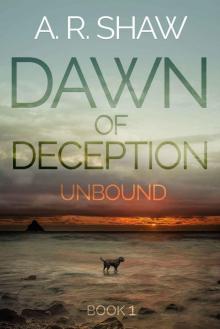 Unbound (Dawn of Deception Book 1)
Unbound (Dawn of Deception Book 1) Undone: A Post-Apocalyptic Survival Thriller Series (Dawn of Deception Book 2)
Undone: A Post-Apocalyptic Survival Thriller Series (Dawn of Deception Book 2)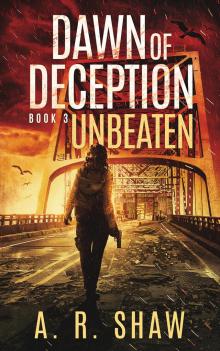 Unbeaten
Unbeaten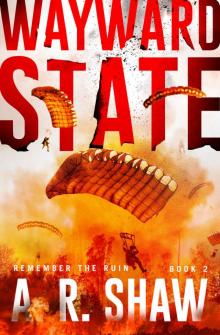 Wayward State
Wayward State Unbound
Unbound Undone
Undone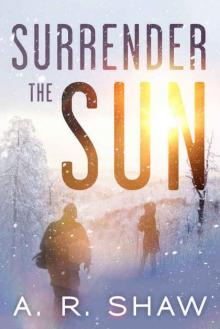 Surrender the Sun: A Post Apocalyptic Dystopian Thriller
Surrender the Sun: A Post Apocalyptic Dystopian Thriller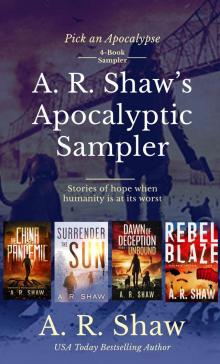 A. R. Shaw's Apocalyptic Sampler: Stories of hope when humanity is at its worst
A. R. Shaw's Apocalyptic Sampler: Stories of hope when humanity is at its worst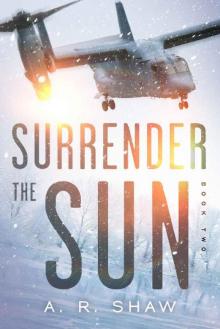 Sanctuary: A Post Apocalyptic Dystopian Thriller (Surrender the Sun Book 2)
Sanctuary: A Post Apocalyptic Dystopian Thriller (Surrender the Sun Book 2)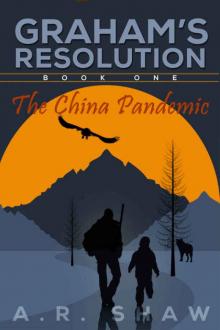 The China Pandemic
The China Pandemic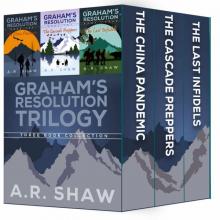 Graham's Resolution Trilogy Bundle: Books 1-3
Graham's Resolution Trilogy Bundle: Books 1-3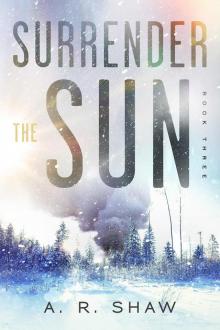 Point of No Return: A Post Apocalyptic Dystopian Thriller (Surrender the Sun Book 3)
Point of No Return: A Post Apocalyptic Dystopian Thriller (Surrender the Sun Book 3) The Malefic Nation (Graham's Resolution Book 4)
The Malefic Nation (Graham's Resolution Book 4)